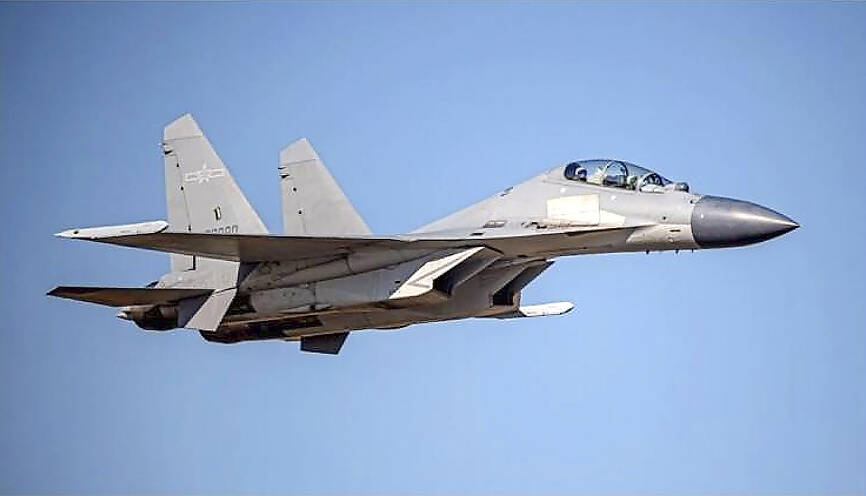Twenty-five Chinese military aircraft and four naval ships were detected around Taiwan from 6am Saturday to 6am yesterday, including eight airplanes that had crossed the median line of the Taiwan Strait and another two that entered Taiwan’s air defense identification zone (ADIZ).
The People’s Liberation Army (PLA) aircraft that entered Taiwan’s southwestern ADIZ were a Y-8 anti-submarine plane and a BZK-005 uncrewed aerial vehicle, the Ministry of National Defense said.
The aircraft that flew across the median line include two Sukhoi Su-30 fighter jets, four J-16 multipurpose fighters and two J-10 jets, the ministry’s official Web site showed.

Photo: AP / Ministry of Defense
Taiwan’s armed forces monitored the situation and tasked combat air patrol aircraft, navy vessels and land-based missile systems to respond to China’s actions, the ministry said.
The sorties occurred following the US and the EU expressing their concern on Friday in Washington over what they said were China’s “provocations” in the Taiwan Strait.
The two sides after bilateral meetings “expressed concern about China’s provocations that increase the risk of crisis in the [Taiwan] Strait.”
It was unclear whether Beijing was trying to send a message to the US and the EU. China’s government sees such statements and warnings as interference in its “internal affairs.”
The number of sorties over Saturday and Sunday were more than usual.
The defense ministry has been posting information about Chinese warplane and naval vessel activities since Sept. 17, 2020, amid a growing frequency of incursions by Chinese military aircraft into Taiwan’s ADIZ.
An ADIZ is an area declared by a country to allow it to identify, locate and control approaching foreign aircraft, but it is not part of territorial airspace as defined by international law.

US President Donald Trump said "it’s up to" Chinese President Xi Jinping (習近平) what China does on Taiwan, but that he would be "very unhappy" with a change in the "status quo," the New York Times said in an interview published yesterday. Xi "considers it to be a part of China, and that’s up to him what he’s going to be doing," Trump told the newspaper on Wednesday. "But I’ve expressed to him that I would be very unhappy if he did that, and I don’t think he’ll do that," he added. "I hope he doesn’t do that." Trump made the comments in

NOT AN OPENING: Trump’s violation of international law does not affect China’s consideration in attacking Taiwan; Beijing lacks capability, not precedent, an official said Taiwanese officials see the US’ capture of the president of Venezuela as a powerful deterrent to Beijing’s aggression and a timely reminder of the US’ ability to defeat militaries equipped with Chinese-made weapons. The strikes that toppled Venezuelan President Nicolas Maduro signaled to authoritarian leaders, including Chinese President Xi Jinping (習近平), US President Donald Trump’s willingness to use military might for international affairs core to US interests, one senior official in Taipei’s security circle said. That reassured Taiwan, the person said. Taipei has also dismissed the idea that Trump’s apparent violation of international law could embolden Beijing, said the official, who was not

A cold surge advisory was today issued for 18 cities and counties across Taiwan, with temperatures of below 10°C forecast during the day and into tonight, the Central Weather Administration (CWA) said. New Taipei City, Taipei, Taoyuan and Hsinchu, Miaoli and Yilan counties are expected to experience sustained temperatures of 10°C or lower, the CWA said. Temperatures are likely to temporarily drop below 10°C in most other areas, except Taitung, Pingtung, Penghu and Lienchiang (Matsu) counties, CWA data showed. The cold weather is being caused by a strong continental cold air mass, combined with radiative cooling, a process in which heat escapes from

Snow this morning fell on Alishan for the first time in seven years, as a strong continental cold air mass sent temperatures plunging across Taiwan, the Central Weather Administration (CWA) said. The Alishan weather station, located at an elevation of about 2,200m in central Taiwan, recorded snowfall from 8:55am to 9:15am, when the temperature dropped to about 1°C, the CWA said. With increased moisture and low temperatures in the high-altitude Alishan area, the conditions were favorable for snow, CWA forecaster Tsai Yi-chi (蔡伊其) said. The last time snow fell at the Alishan weather station was on Jan. 10, 2018, while graupel fell there